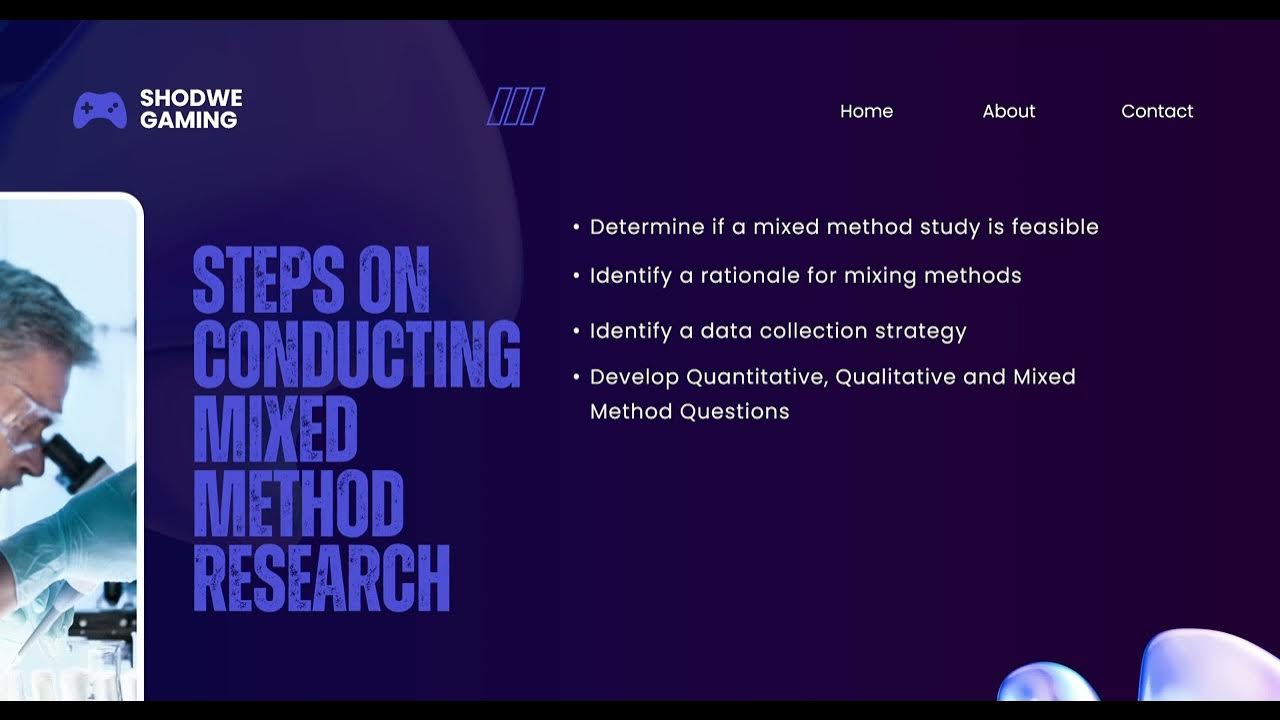What Skills are Needed for Mixed Methods Research?
Summary
TLDRIn this informative video, John Creswell from the University of Nebraska-Lincoln discusses the essential skills needed for conducting mixed methods research. He outlines the general research process and emphasizes the importance of both quantitative and qualitative research foundations. Creswell explains the rigorous procedures involved in each approach, offers practical checklists for conducting studies, and highlights various qualitative designs. He concludes by detailing the specific skills necessary for mixed methods research, including integration of data types and crafting effective research questions, encouraging viewers to pursue further education and training in this evolving field.
Takeaways
- 😀 Understanding mixed methods research requires foundational skills in both quantitative and qualitative research.
- 📊 A good mixed methods study demands rigorous qualitative and quantitative approaches; neither can be abbreviated.
- 🔍 The general research process involves identifying a research problem, reviewing literature, specifying purpose and questions, collecting and analyzing data, interpreting findings, and writing results.
- 📈 Key elements of quantitative research include identifying variables, using close-ended instruments, conducting statistical analysis, and reporting results in a standard format.
- 📝 A checklist for quantitative studies includes guidelines on research design, participant recruitment, data collection, and analysis procedures.
- 🏥 In health sciences, similar quantitative designs are used, such as observational studies and controlled trials.
- 🌱 Qualitative research focuses on exploring a central phenomenon through open-ended questions and detailed participant perspectives.
- 🎨 Qualitative data analysis involves identifying themes, organizing data, and ensuring validity through various strategies.
- 📚 There are various qualitative research designs, including narrative research, phenomenology, grounded theory, case studies, and ethnography.
- 🔗 Skills in mixed methods research involve integrating quantitative and qualitative data, developing rigorous methodologies, and writing effectively for academic journals.
Q & A
What are the essential skills needed for conducting mixed methods research?
-Essential skills include understanding the general research process, skills in quantitative research, skills in qualitative research, and specific skills related to mixed methods research.
What are the general steps involved in the mixed methods research process?
-The general steps include identifying a research problem, reviewing the literature, specifying the purpose and questions, collecting data, analyzing data, interpreting results, and evaluating and writing up the findings.
Why is it important to have a solid foundation in quantitative research for mixed methods studies?
-A solid foundation in quantitative research is crucial because mixed methods studies require rigorous quantitative and qualitative analyses to draw valid conclusions from the data.
What is the difference between qualitative and quantitative research?
-Quantitative research focuses on collecting numerical data and statistical analysis, while qualitative research explores deeper insights through open-ended questions and thematic analysis of participants' perspectives.
What types of quantitative designs are commonly used in social sciences?
-Common quantitative designs include true experiments, quasi-experimental designs, single-subject research, correlational designs, and survey research.
What are some common qualitative research designs mentioned in the script?
-Common qualitative designs include narrative research, phenomenological research, grounded theory, case study research, and ethnography.
What are the key elements to consider when conducting qualitative research?
-Key elements include selecting a suitable qualitative design, recruiting purposefully selected participants, collecting various types of qualitative data, and analyzing the data to identify themes.
How does one ensure the validity of qualitative research interpretations?
-Validity can be ensured by using strategies such as checking interpretations with participants, employing multiple coders for reliability, and being transparent about the researcher's own biases and experiences.
What skills are specifically needed for mixed methods research?
-Skills needed include knowledge of mixed methods designs, ability to integrate quantitative and qualitative data, creating mixed methods research questions, and writing mixed methods journal articles.
How can researchers gain the necessary skills for conducting mixed methods research?
-Researchers can gain skills through formal courses, training workshops, self-study by reading relevant literature, and apprenticeships with experienced mixed methods researchers.
Outlines

This section is available to paid users only. Please upgrade to access this part.
Upgrade NowMindmap

This section is available to paid users only. Please upgrade to access this part.
Upgrade NowKeywords

This section is available to paid users only. Please upgrade to access this part.
Upgrade NowHighlights

This section is available to paid users only. Please upgrade to access this part.
Upgrade NowTranscripts

This section is available to paid users only. Please upgrade to access this part.
Upgrade Now5.0 / 5 (0 votes)





